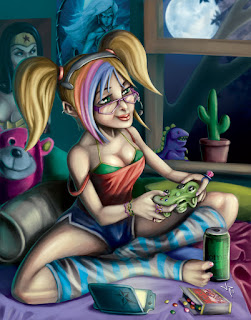 Over the past couple of years, incidents like the Gamergate controversy, among others, have brought to light some very toxic, misogynistic, and anti-LGBTQ views within the gaming industry. The sad thing is, these sorts of attitudes and types of harassment have always been there, it’s just that the ever-growing prevalence of the internet and social media has a tendency to force things front and center. However, despite how unfortunate it is that these mindsets exist, it’s probably good that we are forced to take them on.
Over the past couple of years, incidents like the Gamergate controversy, among others, have brought to light some very toxic, misogynistic, and anti-LGBTQ views within the gaming industry. The sad thing is, these sorts of attitudes and types of harassment have always been there, it’s just that the ever-growing prevalence of the internet and social media has a tendency to force things front and center. However, despite how unfortunate it is that these mindsets exist, it’s probably good that we are forced to take them on.It’s easy to fall into the trap of saying, “Of course these mindsets exist! After all, gaming is essentially a boys’ club!”. But the problem with that is that it's simply not true. Back in the early days of gaming (1980s throughout the mid-1990s) it’s probably fairly accurate to say that the majority of gamers were mostly male, even though there was a decent number of girls and young women who also enjoyed video games. However, time and time again recent studies have shown that female gamers have become a very strong part of the gaming world. The other problem with acknowledging that the gaming industry is “a boys’ club”, is that certain people use this statement as part of the argument and an excuse for negative behavior.
In fact, this attitude is the foundation of a lot of the toxic cultures surrounding popular games, such as PlayerUnknown’s Battlegrounds (“PUBG”) and Fortnite. Now, I get that these “battle royale” styled-games can be a lot of fun (and quite addictive for some people), but the way in which some of these people choose to express this is quite shocking to behold. Since those two games, in particular, rose in popularity, there have been quite a few forum threads, videos, and memes about players getting annoyed that their girlfriends or wives don’t understand their obsession with the game. They also frequently get annoyed when their significant other gets upset, and won’t answer their texts or calls during marathon gaming sessions. Some have even made light of this, saying that their girlfriend obviously doesn’t 'get them' so they have to dump her. I mean, seriously? I don’t know about you, but if someone I was with was treating me that way (and acting like a game was far more important than I was), they wouldn’t have to dump me -- I’d be long gone before then!
 As women actually started to play and enjoy these games, though, another toxic issue arose: they often found themselves being derided for encroaching on this 'male safe space'. The idea was that some viewed these games as a place where they could just be 'one of the guys', could talk freely, and not have to be politically correct or watch what they say, and used the time playing and talking with online friends as their opportunity to unwind and vent. So by having female players around, some males felt that they had to watch their language out of fear of upsetting them or being called out for harassment (if making off-color remarks or jokes). Women could, of course, be accepted into that culture if they were willing to become, “one of the guys”, and not get upset when things got a bit randy. Although those females that didn’t want to conform yet wanted to 'play the game', would often find themselves being accused of a token lady-gamer, who only played games' because their boyfriends or husbands did the same thing.
As women actually started to play and enjoy these games, though, another toxic issue arose: they often found themselves being derided for encroaching on this 'male safe space'. The idea was that some viewed these games as a place where they could just be 'one of the guys', could talk freely, and not have to be politically correct or watch what they say, and used the time playing and talking with online friends as their opportunity to unwind and vent. So by having female players around, some males felt that they had to watch their language out of fear of upsetting them or being called out for harassment (if making off-color remarks or jokes). Women could, of course, be accepted into that culture if they were willing to become, “one of the guys”, and not get upset when things got a bit randy. Although those females that didn’t want to conform yet wanted to 'play the game', would often find themselves being accused of a token lady-gamer, who only played games' because their boyfriends or husbands did the same thing.
This shouldn’t be read as dumping on the communities within two very popular games, though, because it should be pointed out that not all players share those attitudes. It’s simply that a decent number of them have been very vocal about their views. Yet, the main point is that these examples aren’t just limited to those games, but can be found spread throughout the gaming community. While some game communities are certainly better than others, pretty much any competitive online title, including MMORPGs, contain some level of this toxic environment.
 In fact, it isn’t just the players being affected by this, but also YouTube and streaming personalities. For years, female Let’s Players and streamers have been belittled by being told that the only reason their channels were popular was because they had a sexy voice or were a pretty face to look at. A guy, they would argue, would have to work more than twice as hard to get the same number of followers. Others would be accused of being “fake gamer girls,” saying that they only pretended to be into games in order to attract lonely, nerdy male followers to build up their channel. Both attitudes are disgusting and quite insulting, and should only be stated if you have concrete evidence to prove otherwise.
In fact, it isn’t just the players being affected by this, but also YouTube and streaming personalities. For years, female Let’s Players and streamers have been belittled by being told that the only reason their channels were popular was because they had a sexy voice or were a pretty face to look at. A guy, they would argue, would have to work more than twice as hard to get the same number of followers. Others would be accused of being “fake gamer girls,” saying that they only pretended to be into games in order to attract lonely, nerdy male followers to build up their channel. Both attitudes are disgusting and quite insulting, and should only be stated if you have concrete evidence to prove otherwise.
 In fact, it isn’t just the players being affected by this, but also YouTube and streaming personalities. For years, female Let’s Players and streamers have been belittled by being told that the only reason their channels were popular was because they had a sexy voice or were a pretty face to look at. A guy, they would argue, would have to work more than twice as hard to get the same number of followers. Others would be accused of being “fake gamer girls,” saying that they only pretended to be into games in order to attract lonely, nerdy male followers to build up their channel. Both attitudes are disgusting and quite insulting, and should only be stated if you have concrete evidence to prove otherwise.
In fact, it isn’t just the players being affected by this, but also YouTube and streaming personalities. For years, female Let’s Players and streamers have been belittled by being told that the only reason their channels were popular was because they had a sexy voice or were a pretty face to look at. A guy, they would argue, would have to work more than twice as hard to get the same number of followers. Others would be accused of being “fake gamer girls,” saying that they only pretended to be into games in order to attract lonely, nerdy male followers to build up their channel. Both attitudes are disgusting and quite insulting, and should only be stated if you have concrete evidence to prove otherwise.
But women and members of the LGBTQ community (particularly transgender ones) have had an exceptionally difficult time on the developer side of the story too. For years, women designers, writers, and artists have been the subject of harassment and campaigns to get them fired, and this has also sadly been true for transgender women as well. Elements such as poor design choices or story directions would often be blamed on them, and in some cases, campaigns run by toxic hate-groups would try to get them fired and cost them their jobs. And yet, even without being fired, having to deal with harassment for years on end is by no means a fun, or safe, thing for anyone to experience. Thankfully, though, in recent years companies have been standing up to this type of bullying by publically outing groups trying to condone this behavior.
But where does all of this leave us today? If it has been an issue since long before Gamergate, what can we do differently now to try and change these attitudes? Well, that’s the thing: because these issues aren’t just limited to a small handful of incidents, change will require a concerted effort to undo years and years worth of ingrained attitudes and social stigmas. Yet, the best way to actually start to enact change may be one of the most cliche things to say: if you see something that isn’t right, speak out. Do something. Keeping to yourself and being unwilling to confront others and call them out on their bigotry is exactly why this type of stuff goes unpunished and unchanged. If we want to see attitudes change, we should call people out on their hatred and also try to engage in thoughtful discourse with facts and evidence. Militantly defending your views in a hostile way won’t do you any good and will just put people on the defensive, but challenging their views in a respectful way and being willing to engage in thoughtful debate has a much higher chance of success.
Anyway, those are my thoughts on the topic. So please stay tuned for more crafty content coming your way, care of Jessica's Journey, as written by Joypad Jess from NerdyButFlirty.com.
LET THE WOMEN PLAY - FEMALES IN GAMING
 Reviewed by David Andrews
on
August 15, 2018
Rating:
Reviewed by David Andrews
on
August 15, 2018
Rating:
 Reviewed by David Andrews
on
August 15, 2018
Rating:
Reviewed by David Andrews
on
August 15, 2018
Rating:




No comments:
Post a Comment